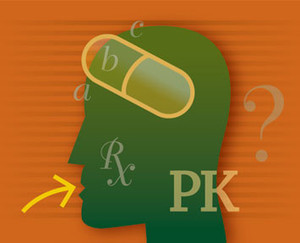Comparison of the clinical pharmacokinetic (PK) profile of a biosimilar with that of the reference product is an important step in the development of biosimilars. In a recent review, Ishii-Watabe and Kuwabara outline key considerations for the comparative studies required for biosimilar development, focusing on the clinical PK profiles of biosimilar therapeutic monoclonal antibodies (mAbs) and their reference products [1].
The comparability assessment between a biosimilar and the reference product is conducted using a stepwise approach, consisting of comparative quality, non-clinical and clinical studies.
Comparative quality studies
Quality attributes of a biosimilar are compared with those of its reference product in comparative quality studies. The attributes compared include primary and higher order structure, post-translational modification, charge isomers, product-related and biological activities. In the case of mAbs, biological activities of antigen-binding, Fcg receptor binding, Fc receptor (FcRn) binding, antibody-dependent cellular cytotoxicity, and complement-dependent cytotoxicity should be assessed.
Pharmacokinetics of biosimilars in non-clinical studies
Similarity between PK parameters of approved biosimilars and their reference products have been assessed in experimental animals; monkeys are most frequently used. Data from these approved biosimilars suggest that comparability in biosimilar PK in humans can be predicted using animal data.
Pharmacokinetics of biosimilars in clinical studies
Evaluating bioequivalence of biosimilars of therapeutic antibodies to their reference products is a required regulatory practice. The long half-lives and possible immunogenicity of therapeutic antibodies require that clinical studies are set up as parallel-group design rather than crossover design. For approved antibody biosimilars, acceptance criterion for the bioequivalence of primary PK parameters (peak concentration and area under the concentration-time curve) was generally that the 90% confidence intervals for the ratio of the geometric mean of the biosimilar to the reference product should be fully within 0.8‒1.25.
Considerations in bioanalytical aspects
The validity of the bioanalytical method used for analysis of drug concentration is crucial in assessing the comparability of PK profiles - a ligand-binding assay such as ELISA is generally used. The fundamental principles of the bioanalytical method used in biosimilar development are the same as described in the bioanalytical method validation guideline. The elements required for validation are specificity, selectivity, accuracy, precision, dilution linearity, calibration curve and stability. The analytical performance should meet the standards defined by the guideline. Reactivity of binding reagents to the biosimilar and reference product is an important consideration in bioanalysis using a ligand-binding assay. Since macromolecules such as mAbs are heterogeneous, their immunoreactivity may vary depending on the manufacturing process. It is important that binding properties of the binding reagent used in PK studies comparing a biosimilar with the reference product are equivalent i.e. that the dose response curves for the products are identical.
From a scientific perspective, elucidating the factors that regulate the PK profile of mAbs and other biologicals in humans may increase the efficiency of biosimilar development and promote the development of innovative mAbs.
Conflict of interest
The authors of the research paper [1] declared that there was no conflict of interest. This study was supported in part by the 'Research on Regulatory Science of Pharmaceuticals and Medical Devices' from the Japan Agency for Medical Research and Development (AMED).
Related articles
Biosimilar comparability assessment
PK and PD comparison between rituximab biosimilar RTXM83 and rituximab in diffuse large B-cell lymphoma patients
Reference
1. Ishii-Watabe A, Kuwabara T. Biosimilarity assessment of biosimilar therapeutic monoclonal antibodies. Drug Metab Pharmacokinet. 2019;31(1):64-90.
Permission granted to reproduce for personal and non-commercial use only. All other reproduction, copy or reprinting of all or part of any ‘Content’ found on this website is strictly prohibited without the prior consent of the publisher. Contact the publisher to obtain permission before redistributing.
Copyright – Unless otherwise stated all contents of this website are © 2019 Pro Pharma Communications International. All Rights Reserved.








 0
0











Post your comment